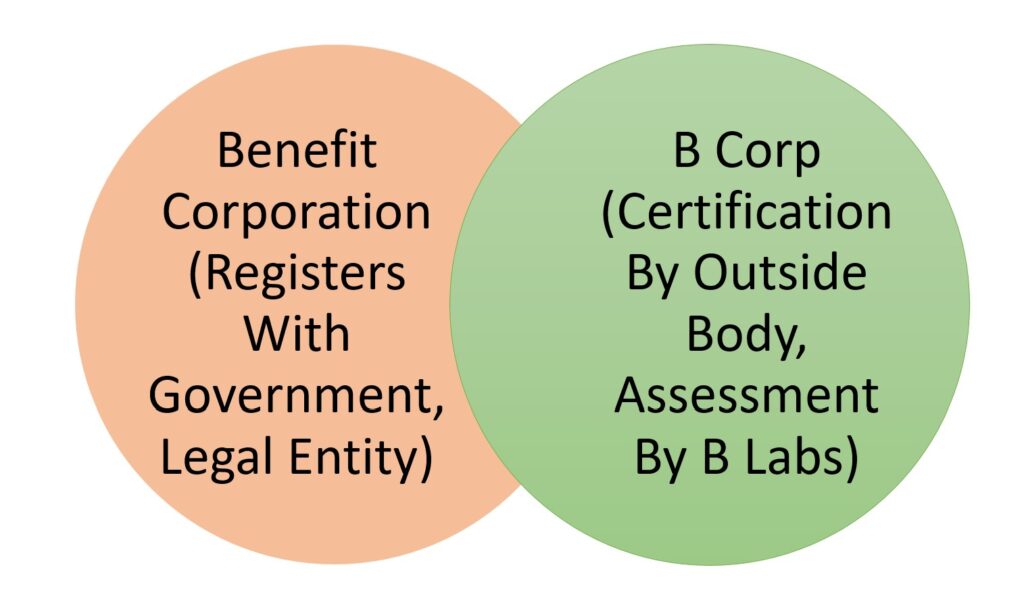One challenge with stakeholder/better business ideas is that there are so many things to be good (and bad) at. Is it enough to be good for the environment if you are awful to your employees? If you give money to your local community does that absolve other sins? Opinions might reasonably differ. As such we need some form of certification for better business.
Whole Corporation Or Product
One challenging question is whether you should assess the whole corporation or the single product. The company might create a product in, for example, a sustainable way. Still, if the company has just moved its unsustainable practices to other products this may not represent progress. As such, B Corp certification specifically looks at the whole entity. The entity as a whole is either certified or not. Labyrinthine corporate structures do complicate this somewhat. Ben & Jerry’s is a B Corp, but Unilever, its parent company is not. (Although to be fair Unilever does seem to pay more attention to a wider range of stakeholders than many firms).
When a company has many brands this presents extra challenges when certifying. (A company using many brands is known as a house of brands, putting the same brand on everything is known as a branded house). When Danone applied for certification, Christopher Marquis tells us, it was important to differentiate what products the logo could be used on. There was a minimum level for each brand to let that brand use the B Corp logo. Certifying a house of brands like Danone is thus a complex endeavor.
Certification Versus Incorporation
In the UK there was the concept of a CIC (community interest company). The company is there to make things better for a variety of stakeholders (beyond the shareholders). The B Corp movement used similar ideas but allow their owners to make more money. The idea is not to dissuade for-profits from doing good. The difference between a B Corp and a normal for-profit is simple, doing good is to be baked into every part of the firm from the outset for a B Corp.
One key distinction is between B Corp certification and being legally a benefit corporation. A not-for-profit, B Labs, certifies B Corp. B Labs checks on how the firm does across a number of categories. The firm will lose its certification if it doesn’t live up to its stated intentions.
On the other hand, legal incorporation as a benefit corporation is about what goals the firm conveys in its paperwork. The company simply declares its aims. The government generally doesn’t really check up.

That said, B Labs wants firms to incorporate as benefit corporations. Though this is only available in some states/jurisdictions.
B Corps that are incorporated in states that have passed benefit corporation legislation are required to become benefit corporations after certification.
Marquis, 2020, page 94
Why?
Protection Against Shareholders
In many ways, certification is more meaningful. There are certainly more checks in a certification process, like that of B Labs, that good things are actually happening. That said, incorporation as a benefit company does matter. It gives some protection should a shareholder sue. Exactly what the law says is often unclear. (And I can’t comment on legal matters, except to say US laws confuse me a lot).
Still, many believe that US law gives shareholders complete rights to do any damn thing they want to do. There is a famous judgment in the US, the Revlon case, that some read as saying shareholders have full control although this seems controversial. Therefore, a dominant shareholder might demand that the staff be paid less. Many think that is the shareholder’s right. This very belief gives the shareholder great power regardless of whether it is legally true. Managers are afraid and act on the shareholder’s request even if the law seems unclear. It is like a horror movie villain. The belief in the monster in the background is enough to cause some terrible things to happen.
Being a benefit corporation clarifies the law. Benefit corporations can very clearly legally take account of all stakeholders. This is explicit given it is what the company said it was there for when people invested. After all, if you invest in a benefit corporation you can’t complain if it benefits people beyond yourself.
Certification And Better Business
I for one see a great deal of value in certifying corporations that aim for wider benefits. There is a direct link between certification and better business. Some involved in business won’t care about the wider stakeholders but for those who do certification is a powerful signal.
For more on politics, business and society see here, here, and here.
To read about B Corp see here.
Read: Christopher Marquis (2020) Better Business How the B Corp Movement is Remaking Capitalism, Yale University Press
